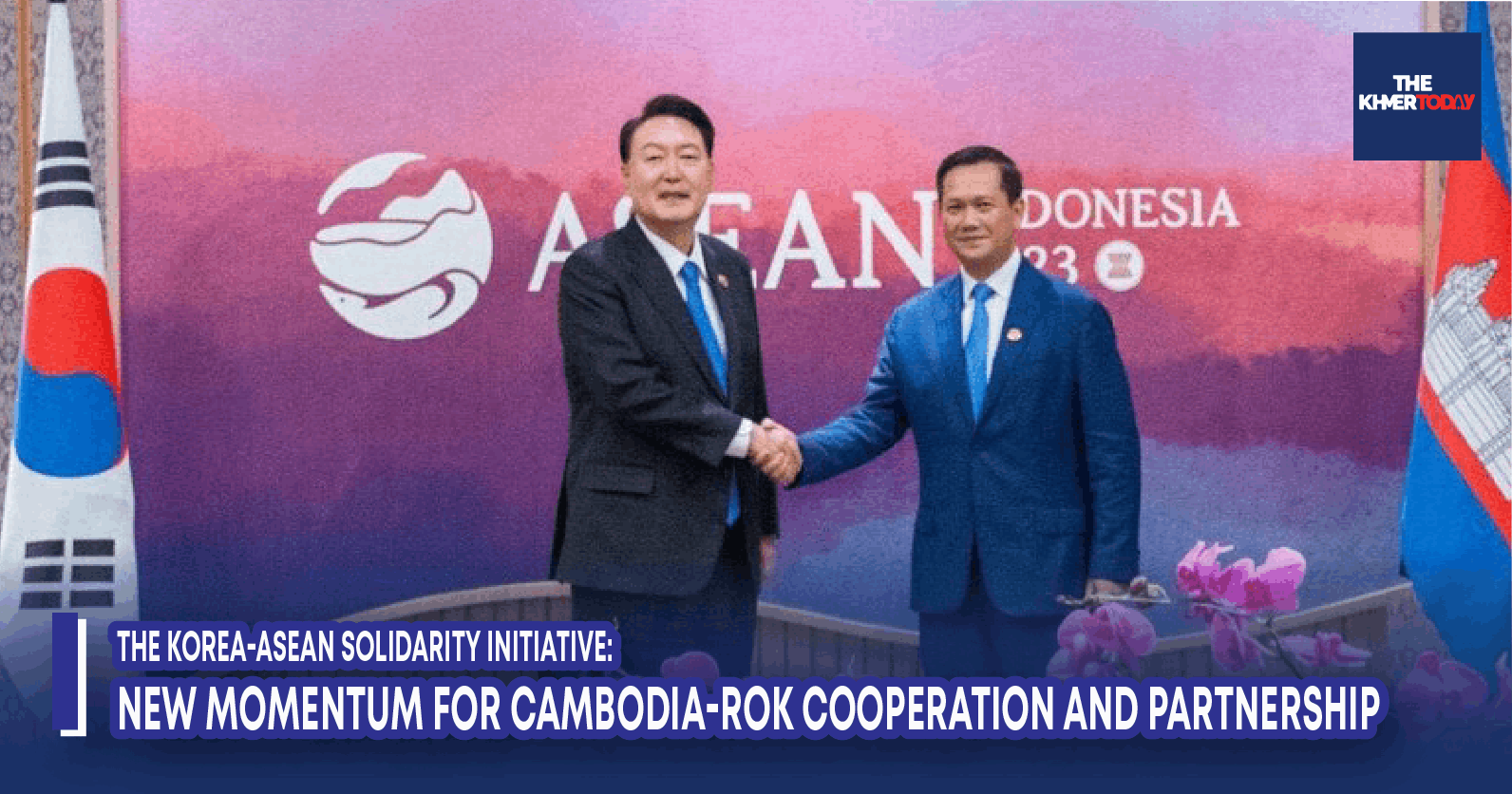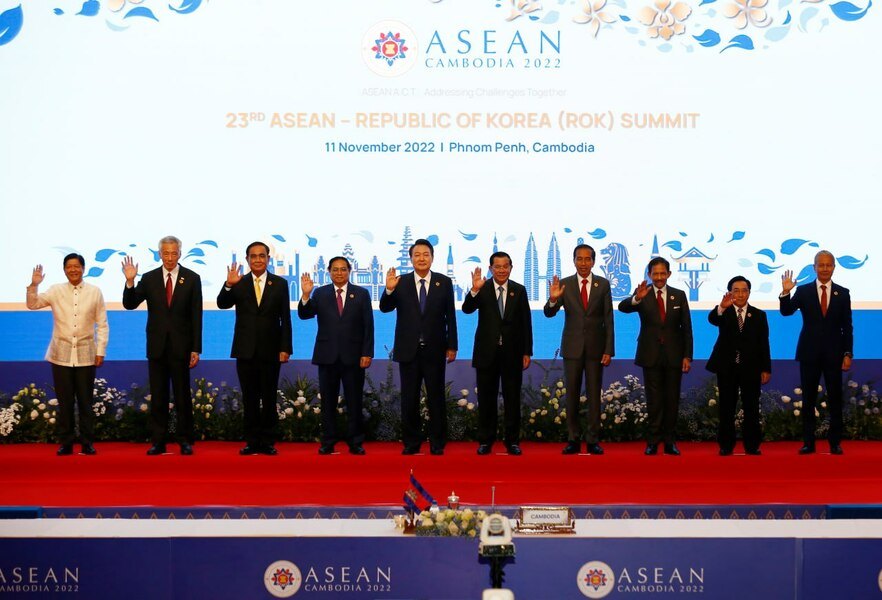THE KOREA-ASEAN SOLIDARITY INITIATIVE: New Momentum for Cambodia-ROK Cooperation and Partnership

Phnom Penh, September 15, 2023 –
The Republic of Korea’s (ROK) Indo-Pacific Strategy (IPS) was announced by President Yoon at the 2022 ASEAN-ROK Summit in Phnom Penh, Cambodia. The ROK’s Indo-Pacific Strategy was established to increase engagement and cooperation with the Indo-Pacific to advance freedom, peace and prosperity in the region under the principle of cooperative inclusivity, trust, and reciprocity.
One of the new IPS policy components is the Korea-ASEAN Solidarity Initiative (KASI). KASI is designed to strengthen cooperation with the Association of Southeast Asian Nations (ASEAN) by enhancement of economic, political, and cultural ties between Korea and ASEAN member countries.
Thus, KASI plays a significant role in sustaining ROK’s Indo-Pacific strategy and maintaining its position within the uncertainty created by superpower competition, while promoting regional cooperation, mutual trust, and the rules-based order.
KASI encompasses various areas such as trade, investment, tourism, education, and people-to-people exchanges and focuses on eight core lines of effort: 1) upgrading bilateral relations; 2) enhancing ASEAN-ROK cooperation within the ASEAN-led mechanism; 3) security cooperation; 4) promoting strategy cooperation; 5) sharing prosperity and development; 6) jointly addressing regional and global challenges; 7) promoting future generation exchanges; and, 8) increasing ASEAN-ROK cooperation resources.
It affirms ASEAN Centrality, supports the ASEAN Outlook on the Indo-Pacific (AOIP) and seeks to upgrade multilateral ties with ASEAN to a ‘Comprehensive Strategic Partnership’ as well as bilateral ties with each member state. KASI is expected to deepen cooperation with ASEAN in areas such as digitalisation, climate change and public health.
For instance, KASI aims to enhance institutions for future cooperation, including the bilateral Free Trade Agreement (FTA). The ROK plans to increase the ASEAN-Korea Cooperation Fund (AKCF) volume to US$32 million by 2027 and support infrastructure, digital and green sectors. Moreover, the ASEAN-Korea Free Trade Agreement (AKFTA) was upgraded to promote digital trade, strengthen e-government infrastructure, and cultivate a skilled workforce in digital-related fields.
In the context of great power rivalry, Cambodia’s approaches to the Indo-Pacific region are complementary to, and converge with, the ROK’s IPS and KASI initiatives. Both countries are committed to promoting an open, peaceful, free, prosperous, and inclusive Indo-Pacific region. Both countries are committed to working with and within ASEAN-led platforms and mechanisms to ensure that the region remains at the centre of regional affairs.
The KASI provides new momentum for Cambodia and the ROK to solidify their cooperation and partnership both bilaterally and multilaterally for peace, stability, development, prosperity, and inclusive growth.
The two countries have already taken some steps to implement their Indo-Pacific strategies. For example, Cambodia and the ROK have signed a number of agreements on economic cooperation, people-to-people exchanges, and capacity building. They have also conducted high-level meetings to discuss their shared interests in the region.
Cambodia-ROK cooperation has strengthened and broadened since 1997 when diplomatic ties were re-established. Since then, trade investment, tourism, and people-to-people connectivity has seen significant increases. Today, the ROK is Cambodia’s 3rd largest development investor and plays a crucial role for Cambodia to achieve its vision as an upper middle-income country by 2030 and high-income country by 2050.
Despite existing and potential benefits from Cambodia-ROK relations for national development, Cambodia must address some challenges before achieving its 2030 and 2050 development goals.
One major challenge is the lack of human resources in the digital sector. According to the Cambodia Digital Economy and Society Framework 2021-2035, Cambodia has a limited digital talent of around 50,000 personnel, and a moderately skilled ICT sector workforce. Additionally, the Kingdom’s digital literacy rate is 80.5 percent, with 30 percent possessing only basic digital skills.
In Cambodia, only 28 percent of students use computers for higher education, compared to 70 percent in Thailand and Indonesia. Digital payment infrastructure development faces challenges such as limited bank participation, lack of common platforms, and limited public awareness, which hinder adoption and access to e-payment services, despite continued modernisation and interbank network connectivity.
While Cambodia has built a world-class digital substructure to empower further advances and integration of the digital superstructure of e-commerce, payment platforms, entertainment, and shared economy applications, it still requires significant consultation and technical assistance from the ROK. Sectors of specific need include financial systems, construction, transportation, AI & big data, labour, energy, and Information and Communications Technology (ICT).
The Royal Government of Cambodia has recognised the critical role of digital technology and services by adding the fifth priority ‘Technology’ to its socio-economic development strategy within the ‘Pentagonal Strategy Phase I’ to achieve digital citizens, digital business, and digital government by 2035.
Firstly, to achieve its development aims Cambodia must assimilate patterns of experience gained through consultation and the processes of establishing comprehensive digital and economic cooperative relations with the ROK. Cambodia and the ROK can enhance digital cooperation by signing agreements, attracting Korean investment, promoting private-sector partnerships, and developing digital skills through incentives, funding, and training in digital literacy and coding.
Cambodia needs the ROK’s assistance with smart city initiatives by sharing its expertise in urban planning, technology integration, and sustainable development. This collaboration aims to enhance Cambodia's urban infrastructure, improve the quality of life for its citizens, and drive economic growth through the implementation of innovative smart city solutions. Embracing this comprehensive approach, Cambodia can leverage the economy via optimisation of its robust connectivity substructure to support and extend its services superstructure.
Secondly, as technology advances and global challenges arise, it is crucial for Cambodian people to develop a forward-thinking mindset that embraces innovation and progress. By doing so, strengthening and broadening people-to-people exchanges between Cambodia and the ROK are essential for building a deeper understanding of developmental approaches.
Cambodia seeks greater promotion and implementation of cultural understanding, education cooperation, and youth exchanges. The ROK could provide further educational opportunities, scholar exchange and enhanced training for Cambodian students.
People-to-people connectivity between the two countries can deepen friendships and cultures to empower individuals and foster mutual understanding. Moreover, enhanced cooperation enables the upgrade of healthcare facilities, enhanced training for medical professionals, robust implementation of comprehensive health programmes, greater provision and use of advanced medical equipment, medical and health capacity-building workshops, and crucial medical missions.
Thirdly, Cambodia’s foreign policy necessitates diversifying partnerships in the region and the world for national security and prosperity. The Kingdom is committed to working with the ROK for the promotion of peace and stability in the region. Cambodia is determined to strengthen cooperation with the ROK on non-traditional security threats such as terrorism, transnational crime, and global warming.
On December 29, 2022, Cambodian and Korean commanders signed a Memorandum of Understanding (MoU) to promote friendship, mutual trust, and peace. The MoU aims to strengthen military cooperation and expand future activities. The signing marks a turning point in history. The foundation of the innovative military relationship has created opportunities and promoted closer ties between the armies of Cambodia and the ROK and is demonstrated by the many successful achievements made thus far, including several exchange visits, human resources joint training, provision of advanced military equipment, and other key areas of military capacity upgrading.
Furthermore, Cambodia recognises the importance of collaborating with the ROK to address emerging challenges in areas such as cybersecurity and climate change. By fostering a strong partnership, both countries can effectively tackle global issues and ensure the well-being of their respective populations.
To sustain and build upon the successes of their 26-year relationship, Cambodia and the ROK need to improve political ties at a high level by sharing and exchanging mutual governance experiences under both existing bi-lateral mechanisms and ASEAN-led initiatives and mechanisms.
This can involve regular diplomatic visits, joint policy discussions, and collaboration on issues of common interest. For economic development, friendly relations encourage both parties to reach more agreements and MOUs, which include joint projects such as infrastructure development and investment in renewable energy. Additionally, people-to-people connectivity between Cambodia and the ROK can be stimulated by encouraging tourism, supporting sister-city relationships, and offering ROK scholarships for Cambodian students. The KASI illuminates both opportunities for Cambodia to diversify partnerships in the new era as well as generate multifaceted momentum for capability-building with the ROK into the future.
